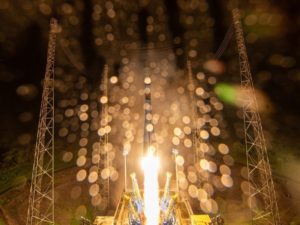
While the likes of SpaceX, NASA and India’s ISRO are generally the space companies in news these days, a generally under-reported but high performing agency in the mix is ESA — the Eurpoean Space Agency. And it just proved its mettle.
The European Space Agency has launched a satellite via the Russian Soyuz rocket earlier this morning. And this isn’t your usual satellite. Christened ‘CHEOPS’ (Characterizing Exoplanet Satellite), it is a satellite that has been launched dedicatedly to study exoplanets (planets orbiting other stars like Sun) near the earth. The takeoff happened at Guiana Space Center in French Guyana. CHEOPS will orbit the Earth to get a better view of the stars that have been previously identified to have planets orbiting them. This was the second try as the first launch was delayed on Tuesday due to equipment failures.
The goal of CHEOPS will be to study exoplanets. Exoplanets are planets that exist outside our solar system. The satellite will study planets as they pass by their star, as they become identifiable by blocking some of the light their star emits. The satellite will not try to identify new exoplanets like other satellites but research the ones that have already been found.
“Cheops will take exoplanet science to a whole new level,” said Günther Hasinger, the agency’s director of science.
The goal will be to identify larger planets. Scale will vary from planets larger than Earth to planets as large as Neptune. The aim is to identify the density of the aforementioned planets. The planets will be judged based on whether they are rocky like our Earth or gaseous like Jupiter or Uranus. The main goal is to answer the looming question: ‘Are we alone?’
“Cheops will help us reveal the mysteries of these fascinating worlds, and take us one step closer to answering one of the most profound questions we humans ponder: are we alone in the Universe?” said Kate Isaak, the mission’s project scientist.
At the time of writing, CHEOPS had made contact with an Antarctic ground station. This is positive news and so far the mission is going just as planned. The rocket carrying CHEOPS also carried some other payloads including additional science and research satellites to be used by the ESA, the French national space agency, and more.



